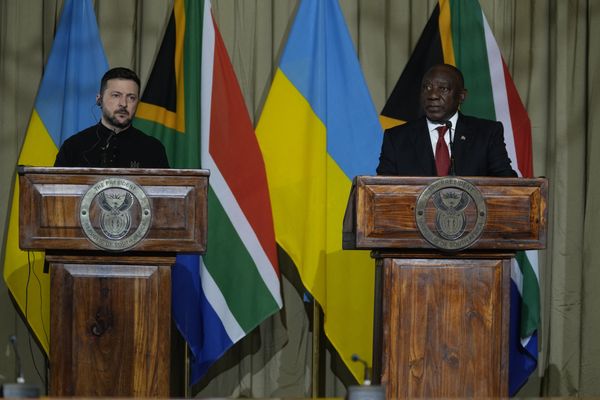
A multi-layered civil war on Australia's doorstep is a prime example of the consequences foreign investors face if they don't share their profits with locals, Papua New Guinea's prime minister says.
James Marape on Monday spruiked his 20-year vision for the rapidly growing Pacific nation to 1700 business leaders, ministers and diplomats in Sydney.
But, pointing to a delegation from the autonomous region of Bougainville, he said foreigners could not be the only ones making good money.
Future investment must result in a "win for all of us".
"The reason we have the Bougainville crisis for instance was the Papua New Guinea government and investors left behind the provincial government and local land owners," Mr Marape said.

Hundreds of soldiers and rebels and an estimated 10,000 to 15,000 civilians died, either from the fighting or from disease and deprivation, during the decade-long civil war that ended in 1998.
The island is currently walking a path towards independence.
Mr Marape underlined his country's history of stable government and an independent judiciary as he invited diversification of the PNG economy.
The $A48 billion economy has grown six-fold since 2002 and 50 per cent in the past five years but remains reliant on upstream mining, oil and gas.
The prime minister, who grew up in a rural province in the country's highlands, expressed frustration at having to import rice, chicken and beef to feed an estimated 11 million mouths, as well as tables made from local timber.
The trend extends to PNG waters, where 80 per cent of the fish catch is processed internationally.
"Twenty years from today, we want to be a country that is industrialised and exporting finished products," Mr Marape said.

Part of that will come through the country's "transparent" foreign policy of being friends to all and enemies to none, Mr Marape said, as he underscored close ties to traditional ally the US and major trading partners China, Japan and Indonesia.
The "family" tag however was reserved for Australia, which has built on its trade and investment ties by fuelling the rugby league-mad nation's $600 million bid to join the NRL.
The bid for the yet-to-be-named club is due to be officially confirmed on Thursday, ahead of its first game towards the end of the decade.
Following Mr Marape's speech, several business leaders took to the stage to underline their efforts to develop a social licence in PNG.
Oil and gas giants Santos and ExxonMobil said their local workforces were made up of 90 per cent local citizens while the latter had also highlighted one in three workers were women.
PNG is the world's most linguistically diverse country, featuring more than 850 indigenous languages.







